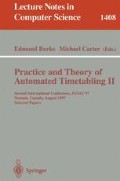Abstract
Basic Match Schedules are important for constructing sports timetables. Firstly these schedules guarantee the fairness of the sports competitions and secondly they reduce the complexity of the problem. This paper presents an approach to the problem of finding Basic Match Schedules for sports competitions. The approach is clarified by applying it to the Dutch volleyball competition. By using graph representation and theory this approach has the potential to classify sports competitions and to build libraries with Basic Match Schedules for each class of sports competitions. As an example we present an overview of some Basic Match Schedules for the volleyball competition.
Preview
Unable to display preview. Download preview PDF.
References
R.R. Bakker et al., Diagnosing and solving over-determined constraint satisfaction problems, Chambéry, 1993, proceedings IJCAI-93.
S. Brandt, Packen und einbetten von Graphen, Freie Universität Berlin, MSc report (in German), 1991.
R. Häggkvist, Decompositions of complete bipartite graphs, Surveys in combinatorics, 1989, pp. 115–147.
E. Köhler, über das Oberwolfacher Problem, 1977, pp. 189–201, proceedings des symposiums über geometrische algebra (in German).
J.A.M. Schreuder, Construction of fixture lists for professional football leagues, University of Strathclyde, PhD thesis, 1993.
J.A.M. Schreuder, Constraint Satisfaction for Requirement Handling of Football Fixture Lists, Belgian Journal of Operations Research, vol. 35, no.2, pp. 51–60, 1995.
A. van Weert, A solution strategy for constructing sport timetables, University of Twente, MSc report (in Dutch), 1994.
D. de Werra, Some combinatorial Models for Course Scheduling, 1996, pp. 296–308, Lecture Notes in Computer Science (1153).
D. de Werra, Some Models of Graphs for Scheduling Sports Competitions, Discrete Applied Mathematics, 21, pp. 47–65, 1988.
R. Willis, Scheduling the Australian State cricket season using simulated annealing, J.Opl.Res.Soc, vol. 45, no. 3, pp. 276–280, 1994.
A.C.S. Wisse, Automatisering van een sportorganisatie, University of Twente, MSc report (in Dutch), 1992.
Author information
Authors and Affiliations
Editor information
Rights and permissions
Copyright information
© 1998 Springer-Verlag Berlin Heidelberg
About this paper
Cite this paper
van Weert, A., Schreuder, J.A.M. (1998). Construction of basic match schedules for sports competitions by using graph theory. In: Burke, E., Carter, M. (eds) Practice and Theory of Automated Timetabling II. PATAT 1997. Lecture Notes in Computer Science, vol 1408. Springer, Berlin, Heidelberg. https://doi.org/10.1007/BFb0055890
Download citation
DOI: https://doi.org/10.1007/BFb0055890
Published:
Publisher Name: Springer, Berlin, Heidelberg
Print ISBN: 978-3-540-64979-3
Online ISBN: 978-3-540-49803-2
eBook Packages: Springer Book Archive

